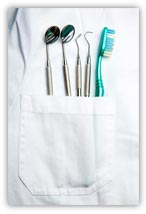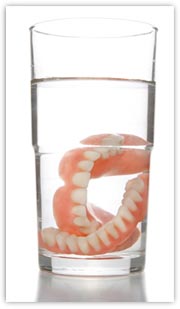
Dentures are used to replace missing teeth that can be taken out and put back into your mouth.
There are generally two types of dentures available: complete dentures and partial dentures.
The type that is needed can be determined by your dentist. Typically complete dentures are used to replace all teeth and partial dentures are used when you still have some of your natural teeth in place.
Dentures are employed so that patients who suffer from tooth loss because of periodontal disease (gum disease), tooth decay, or traumatic injury don’t have to suffer the negative effects of not having teeth.
Besides the obvious reason of eating, replacement teeth are needed so that remaining teeth do not shift and so that a sagging facial appearance does not give the impression of making one appear older than they are.
Dentures have a brief adjustment period and never feel exactly the same as one’s natural teeth.
However, they are designed to be comfortable and functional and have a similar appearance to natural teeth, improving the smile and facial appearance.

How Do Dentures Work?
Depending on the type of denture you need, complete or partial, will determine how the dentures fit and function.
Dentures are custom-made in a dental laboratory from impressions of your mouth that your dentist will take in a preliminary evaluation.
Complete Denture- Complete dentures contain a flesh-colored acrylic base that fits over your gums.
The base of the upper denture covers the palate (roof of your mouth), and the lower denture is horseshoe shaped to accommodate the tongue. Complete dentures can either be “custom” or “immediate.”
Custom dentures are made after the teeth have been removed and the gum tissue has begun to heal. This type of denture is ready for use about 3 to 6 months after tooth removal.
Immediate dentures are made in advance and can be positioned as soon as the teeth are removed so that the wearer does not have to be without teeth for the healing period as in conventional dentures.
The disadvantage to this is that they must be relined several months after being inserted. Bones and gums shrink over time, especially during the healing period following tooth removal.
For this reason, immediate dentures should only be considered a temporary solution until conventional dentures are made.
Partial Denture– A removable partial denture or bridge usually is made of replacement teeth attached to a gum-colored plastic base, which rests on a metal framework that attaches to your natural teeth.
Partial dentures are used when one or more natural teeth remain in the upper or lower jaw. A fixed bridge will replace one or more teeth by placing crowns on the teeth on either side of the space and attaching artificial teeth to them.
The partial denture not only fills in the spaces created by missing teeth, it prevents other teeth from changing position.
They are removable and have internal attachments rather than clasps that attach to adjacent crowns for a look that is more natural-looking and comfortable.
Denture Adjustment Period
Naturally, a new set of teeth will take some adjusting and adapt to feel, eating, and speak.
Initially the dentures may feel a little odd or loose for a few weeks until the muscles of your cheek and tongue learn to keep them in place and you get comfortable inserting and removing them.
It is common for minor irritation or soreness to occur and for saliva flow to increase when you first start wearing dentures, but these problems will diminish as your mouth adjusts to the new denture.
Learning to eat with new dentures also takes a little practice and wearers may experience a few weeks of an uncomfortable adjustment period.
Your dentist will most likely recommend that you start eating soft foods cut into small pieces as you grow accustomed to eating with dentures.
After the initial adjustment period, you can go back to eating whatever it is you like as part of your normal diet.
There are, however, some foods that you may want to avoid such as hot or hard foods and sharp-edged bones or shells. You may also want to avoid foods that are extremely sticky such as gum or chewy candies.
Some patients have experienced difficulty pronouncing certain words. This is normal and takes a little practice to learn to speak properly with dentures.
If the speaking problem persists then you should consult your dentist. Additionally, if you experience irregular periods of discomfort, you should contact your dentist for assistance with your dentures.
Your dentures may require repositioning as they may occasionally slip when you laugh, cough, or smile. Any clicking noises that come from your dentures should be addressed immediately by your dentist.
Alternatives to Dentures
There are other methods available to help restore missing or damaged natural teeth. The options available depend on your personal situation, and your dentist can help you decide what you may or may not be a candidate for.
In some cases, denture alternatives may actually be preferred for physical reasons. The following is a list of potential denture alternatives.
Dental Implants– Dental implants are surgically positioned titanium posts that are inserted directly into the jaw bone.
After the healing process, a new tooth that has been created of a model of your bite is attached to the titanium.
The teeth are matched for color and they look, feel and function just like natural teeth. This alternative is more expensive but more closely resembles real teeth.
Porcelain Veneers– Porcelain veneers are thin pieces of porcelain that closely resemble natural teeth in look and feel.
They are adhesively bonded to the front of the tooth, to replace teeth that are badly stained, chipped, worn or fractured. The veneers are strong and offer a pleasing esthetic result to a smile.

Dentures Cost
Most dental insurance providers will cover some or all of the costs incorporated with dentures.
Contact your provider to find out more about the specifics of what they will cover and eligibility requirements.
As with most dental procedures, dentures cost will vary depending on several different factors, including:
- Your dentist
- The possibility of additional dental procedures such as removing teeth or oral surgery to refine bone
- The complexity of the removable denture that you require
- Materials selected by you and the dentist. Denture materials vary between more expensive highly cross-linked polymer denture teeth that are more esthetic to conventional plastic teeth that are less expensive.
- Warranty offered
Dentures cost between $400 to $8,000. This does not include the cost of possible tooth removal, oral surgery, or other restorative procedures.
The variation in cost is related to fabrication time, cost of materials, and the experience of the dentist. Often dentists will offer flexible financing plans so that most patients will be able to afford these types of dental treatments.
